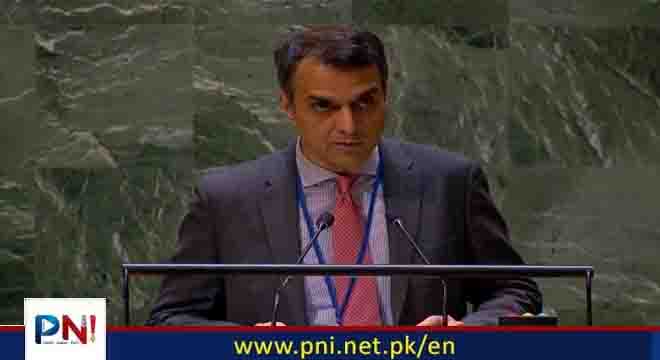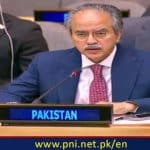UNITED NATIONS, Oct 08 : Pakistan has called for a holistic approach to fight transnational organized crime that tackles the root causes, promotes social inclusion, and ensure equal access to justice for all.
“Transnational organized crime continue to impede the rule of law, economic development and achievement of the 2030 Agenda for sustainable development,” Ambassador Usman Iqbal Jadoon, deputy permanent representative of Pakistan to the UN, told the UN General Assembly’s Third Committee, which deals with social, humanitarian and cultural issues.
Speaking in a debate on crime prevention and criminal justice and countering the use of information and communications technologies for criminal purposes, he said that climate change, with its devastating impacts, provides new opportunities for organized criminal groups to infiltrate vulnerable situations.
Other forms of transnational organized crimes, particularly money-laundering, cybercrime, corruption, human smuggling and trafficking, continue to pose formidable challenges, the Pakistani envoy pointed out.
Ambassador Jadoon highlighted Pakistan’s efforts to combat money laundering and terror financing, including by setting up an independent financial monitoring unit to cooperate with other countries to wipe out the menace.
Drawing attention to a surge in hate crimes, including those fueled by Islamophobia, and other acts of provocation that incite intolerance and violence based on race, ethnicity, religion, or belief, he stressed stressed the need for fostering mutual respect for religious and cultural beliefs to promote understanding and coexistence.
The use of ICTs (information and communications technologies) for criminal purposes facilitates and enables several other types of crimes including illicit financial flows and corruption, posing a substantial challenge to global security, he said.
Ambassador Jadoon added that the exponential proliferation of disinformation through online platforms and social media has exacerbated social discord, competing nationalisms, discrimination, hate speech, stigmatization, racism, xenophobia, Islamophobia and related intolerances.
Pakistan, he said, looks forward to contributing constructively to the upcoming negotiations on the draft supplementary protocol to the Convention.
“This protocol should encompass additional criminal offenses, including cyber enabled crimes, to comprehensively address the concerns of all Member States,” he said, while calling for fostering greater international cooperation, capacity-building, and legal frameworks to ensure a secure cyberspace for all.
As regards world drug problem, the Pakistani envoy said it continues to take a heavy toll on health, safety, security, socioeconomic development and well-being of individuals, families and society as a whole.
“In addition to persistent challenges, the emerging challenges including, for instance, the proliferation of New Psychoactive Substances, and the growing use of darknet for illicit drug purposes are a matter of serious concern,” he said.
“The Government of Pakistan remains firmly committed to eradicate the scourge of drug-abuse organized crime and the use of ICTs for criminal purposes through cooperative global efforts,” Ambassador Jadoon added.
Follow the PNI Facebook page for the latest news and updates.








